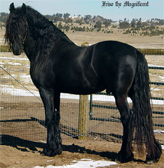Vitamin E plays an essential part when maintaining your horse’s overall health. This antioxidant is found in every single cell of your animal and is responsible for keeping your horse’s tissues healthy and strong. From the eyes, liver, spinal cord, heart, and joints, your horse is made up of this vitamin. Horses tend to burn up Vitamin E quickly, especially after vigorous exercise, and if your animal burns up too much of it without replacing what it lost, it can lead to serious problems.
Your horse cannot function without the proper amount of Vitamin E in its system, and a deficiency can lead to a poor immune system, muscle damage, recurring colds, and disease, especially in younger horses.
A recent study done by the California Animal Health and Food Safety Laboratory System at UC Davis has recently found a connection between Equine Degenerative Myeloencephalopathy (EDM), and a Vitamin E deficiency. EDM is a serious neurological disease that occurs in many foals. This disease can be life-threatening and extremely debilitating.

According to the study, a five-month-old Friesian Filly was being treated for leg spasms and paresis in its back and front legs. When studying the animal further, doctors noticed a lack of Vitamin E in the animal’s liver, as well as well as lesions in the animal’s spinal cord and brain. EDM has been previously linked with Vitamin E deficiencies in horses, which is why it is important to properly maintain your animal’s Vitamin E levels.
Your animal does not produce Vitamin E on its own, which means your animal’s main source of this antioxidant is coming from dietary sources. Your animal can get Vitamin E by consuming fresh grass, but that isn’t always going to be enough. It can take up to 12 hours of grazing in order for your animal to get proper levels of Vitamin E. Supplementations should be added to your horse’s diet as well, due to the fact grazing is such a time-consuming process.
Vitamin E supplements should be included in your horse’s diet to make sure your horse has consistent, healthy levels of Vitamin E. Always consult with a veterinarian if you are unsure of whether or not your animal is getting enough Vitamin E in its diet, or if you are unsure of how much of the antioxidant your animal should be consuming.





; ?>/wp-content/themes/twentyten/img/NMImacLogo_150.jpg)






